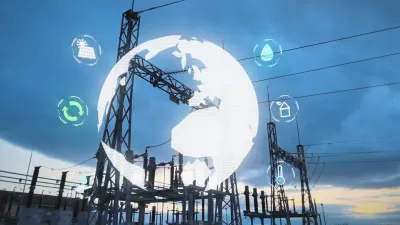Emerging technologies like AI have great promise for climate innovation, but also a hidden environmental footprint could lead to disproportionate harm to low-income and marginalized communities.

A research article from the Brookings Institution calls attention to the growing environmental impacts of artificial intelligence (AI) and its impact on climate-related racial disparities. Data from the Fifth National Climate Assessment reveal that the U.S. is warming faster than the rest of the world from human-induced climate change and showed that climate impacts have unequal burdens that fall most heavily on communities of color and low-income communities, according to researchers Joseph B Keller, Manann Donoghow, and Andre M. Perry.
“[T]o effectively address these harms and lay a strong foundation for climate and environmental justice, policymakers must acknowledge and confront the growing environmental impacts of an emerging technology: artificial intelligence (AI),” they write. The Keller et. al liken the industrial shift AI is propelling to the advent of previous technologies that unequally distributed societal benefits, as well as point to AI’s growing but often hidden footprint. While technology is often considered “cleaner” than processes and equipment that rely on fossil fuels, they still require extensive amounts of energy and water to function. The article cites research that suggests a single ChatGPT query consumes four to five times more energy than a typical search engine request, and image-generating tasks even more. These energy and resource demands will only increase as the technology’s adoption becomes more widespread.
The Brookings researchers acknowledge that AI, adopted in a conscientious manner, will be an key part of the climate solution in the U.S., but say it is vital to first improve transparency around the technology’s environmental impacts and adopt considerations for its environmental impacts in order to prevent the perpetuation of environmental injustice. “By centering justice, we can mold a more transformative and sustainable climate policy designed for an emerging digital future,” Keller et al. write. “The U.S. stands on the brink of a tremendous opportunity to collaborate with major actors in the AI industry and improve transparency around the technology’s environmental impacts. Subsequent climate assessments must incorporate considerations for AI’s environmental footprint—a crucial step in preventing disproportionate harm in the most vulnerable communities,” the authors write.
FULL STORY: The US must balance climate justice challenges in the era of artificial intelligence

Maui's Vacation Rental Debate Turns Ugly
Verbal attacks, misinformation campaigns and fistfights plague a high-stakes debate to convert thousands of vacation rentals into long-term housing.

Planetizen Federal Action Tracker
A weekly monitor of how Trump’s orders and actions are impacting planners and planning in America.

Chicago’s Ghost Rails
Just beneath the surface of the modern city lie the remnants of its expansive early 20th-century streetcar system.

Bend, Oregon Zoning Reforms Prioritize Small-Scale Housing
The city altered its zoning code to allow multi-family housing and eliminated parking mandates citywide.

Amtrak Cutting Jobs, Funding to High-Speed Rail
The agency plans to cut 10 percent of its workforce and has confirmed it will not fund new high-speed rail projects.

LA Denies Basic Services to Unhoused Residents
The city has repeatedly failed to respond to requests for trash pickup at encampment sites, and eliminated a program that provided mobile showers and toilets.
Urban Design for Planners 1: Software Tools
This six-course series explores essential urban design concepts using open source software and equips planners with the tools they need to participate fully in the urban design process.
Planning for Universal Design
Learn the tools for implementing Universal Design in planning regulations.
planning NEXT
Appalachian Highlands Housing Partners
Mpact (founded as Rail~Volution)
City of Camden Redevelopment Agency
City of Astoria
City of Portland
City of Laramie





























